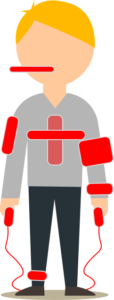Vital signs
Vital signs are measured variables that reflect the basic functions of the human body. They allow numerous conclusions to be drawn about our health. For this reason, vital signs are measured and evaluated in medicine to check vital functions. Vital signs include respiratory rate, blood pressure, body temperature, pulse rate and oxygen saturation.
Blood pressure
Blood pressure is the pressure (force per area) of the blood in the blood vessels. It is directly related to cardiac output and vascular resistance. It is highest in the aorta and continues to decrease as blood flows through the circulatory system through arteries, capillaries and veins until it returns to the heart. In a healthy body, blood pressure regulates itself. Elevated blood pressure has negative effects on health and life expectancy that are often not subjectively perceived. Therefore, blood pressure should be measured from time to time. Blood pressure is usually expressed in mmHg (millimeters of mercury).
Body temperature
Body temperature is essential for maintaining all vital functions and metabolic processes. In humans, as warm blooded species, the body temperature is largely constant. However, various external and internal influences can reduce or increase it. Measuring body temperature therefore provides important information about a person’s health.
Pulse rate
In medicine, the term pulse rate refers to the number of pulses generated by the heart’s activity in the blood vessels during a specific unit of time (usually one minute). As a rule, the pulse rate coincides with the heart rate. Various factors, such as exercise, stress or certain diseases, can influence the pulse rate in the short or long term.
Oxygen saturation
Oxygen saturation (sO2) refers to the percentage amount of oxygen in the blood. Among other things, it provides information about the functional capacity of the lungs and the effectiveness of oxygen transport in the blood. Oxygen saturation can be determined either outside the body via pulse oximetry or invasively with the aid of a blood gas analysis.
Respiration Rate
Respiration rate is the number of breaths per unit of time (usually per minute). It affects heart rate, blood pressure and oxygen saturation. The respiratory rate, like all vital signs, depends on individual variations and external influences. It is an important parameter for assessing the state of health.
cosinuss° Technology
The Measurement with invasive, stationary and expensive devices is immobile and restricting and too many devices are needed to monitor multiple vital signs simultaneously. The Measurement with one in-ear wearable is non-invasive, mobile and cost-efficient. The cosinuss° technology is a convenient way to monitor multiple vital signs at once.

